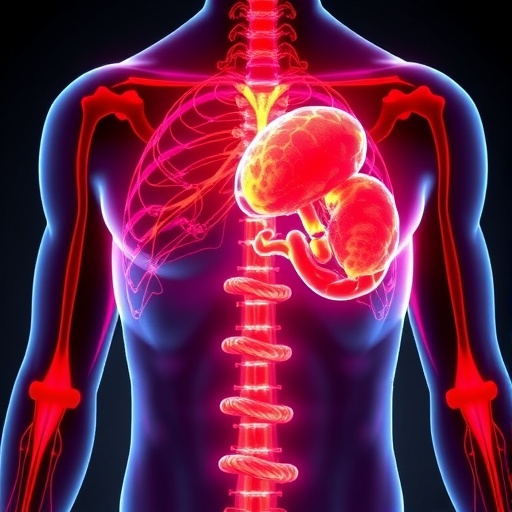In a groundbreaking Danish cohort study recently published in BMC Cancer, researchers have unveiled compelling evidence linking new-onset anaemia of inflammation to a markedly increased risk of cancer, with an intriguing differential effect based on patients’ existing comorbidity status. This expansive population-based study, conducted among patients aged 40 to 89, reveals that anaemia—long known as a multifaceted clinical problem—may serve as a critical harbinger of undiagnosed malignancies, particularly in individuals without prior comorbid conditions.
Anaemia of inflammation, a complex and frequently encountered subtype of anaemia, arises primarily from chronic immune activation and disrupted iron metabolism. While it is often associated with underlying comorbidities such as chronic infections or autoimmune diseases, its role as a potential early signal of cancer has remained ambiguous. This ambiguity has posed a clinical conundrum: distinguishing whether anaemia of inflammation stems from existing chronic illness or ominously signals an underlying malignancy has proven challenging, significantly complicating diagnostic pathways.
To elucidate this dilemma, the investigative team harnessed comprehensive data from laboratory records across the North and Central Denmark regions, synergistically integrated with national healthcare registries. Their methodology centered on including patients with newly identified anaemia of inflammation between 2013 and 2018, specifically excluding those with any previous cancer diagnosis to isolate incident cancer risk related to anaemia onset. The study’s primary endpoint was the incidence of cancer within the first year following anaemia diagnosis, offering a potent window into the malignancy risk landscape in this patient population.
The study population consisted of 2,640 patients with a median age of 70 and a predominance of males (61.1%). Remarkably, nearly 17% of these patients were diagnosed with cancer within twelve months after their anaemia diagnosis. Even more striking was the finding that patients without any pre-existing comorbidities exhibited the highest cancer incidence rate at over 20%, compared to 11.7% in those with pre-existing conditions. This nearly two-fold increase translated into a cancer incidence proportion ratio of 1.78, with rigorous statistical confirmation underscoring the robustness of this association.
Advanced analytical modeling further reinforced these findings. Adjusted Cox regression analysis demonstrated that patients lacking prior comorbidities faced an 89% higher risk of cancer following anaemia onset in comparison to their counterparts, delivering a hazard ratio of 1.89. This significant elevation highlights the paramount importance of anemia as a potential clinical biomarker necessitating heightened cancer vigilance, especially in seemingly healthier individuals.
From a pathophysiological viewpoint, these insights underscore the dual challenge anaemia of inflammation presents to clinicians. While traditionally perceived as a sequela of chronic disease, anaemia in this context demands a more nuanced interpretation, invoking suspicion for occult malignancy. This subtle but critical distinction equips healthcare professionals with a powerful tool to refine patient evaluation strategies and streamline early cancer detection efforts.
Beyond its immediate clinical implications, the study’s findings invite broader reflection on cancer biology and systemic inflammation. The interplay between immune dysregulation, iron homeostasis, and tumorigenesis highlighted by anaemia’s diagnostic complexity suggests fertile ground for future research. Understanding how inflammatory pathways intersect with neoplastic processes could unlock transformative diagnostic and therapeutic innovations.
Moreover, the study sheds light on potential gaps in current clinical guidelines. Given the substantial cancer incidence associated with new-onset anaemia of inflammation, particularly in individuals without notable comorbidities, existing protocols may warrant re-examination and enhancement to incorporate systematic cancer risk assessment protocols alongside anaemia evaluation.
These revelations gain added significance considering the aging global population and the rising burden of chronic diseases and cancer. Early detection remains the cornerstone of improving cancer outcomes, and integrating indicators like anaemia of inflammation into screening paradigms promises to elevate precision medicine approaches and personalized risk stratification.
The research team emphasizes the necessity for general practitioners and specialists alike to adopt heightened awareness when confronted with patients exhibiting new-onset anaemia of inflammation. Prompt and thorough investigation into potential underlying malignancies, especially in patients without chronic illnesses, could facilitate early diagnosis and significantly improve prognostic trajectories.
As this study sheds essential light on an often overlooked marker of cancer risk, it ultimately advocates for a paradigm shift in clinical practice. Anaemia of inflammation should no longer be dismissed purely as a symptom of chronic disease but recognized as a sentinel warning sign demanding rigorous oncological consideration.
In conclusion, this pivotal Danish cohort study fundamentally redefines the clinical narrative surrounding new-onset anaemia of inflammation. Its illuminating findings make a compelling case for prioritizing cancer investigation within this patient subset, ultimately steering the medical community towards more effective diagnostic vigilance and, potentially, earlier therapeutic intervention.
Such advances underscore the inextricable link between systemic inflammation, hematologic changes, and oncogenesis, fostering a more integrated understanding that promises to enhance patient care and outcomes on a global scale.
As future research continues to unravel the complexities of anaemia-related cancer risk, clinicians and researchers are called upon to translate these insights into actionable clinical pathways, transforming a diagnostic challenge into a clinical opportunity.
The study is a beacon for improving early cancer detection, catalyzing shifts in both research focus and clinical management strategies that could save countless lives through timely intervention.
Subject of Research: Cancer risk associated with new-onset anaemia of inflammation relative to comorbidity status in middle-aged and elderly patients
Article Title: Anaemia of inflammation and cancer risk according to comorbidity in patients aged 40–89 years: a Danish cohort study
Article References:
Boennelykke, A., Østgård, L.S.G., Falborg, A.Z. et al. Anaemia of inflammation and cancer risk according to comorbidity in patients aged 40–89 years: a Danish cohort study. BMC Cancer 25, 1589 (2025). https://doi.org/10.1186/s12885-025-14978-0
Image Credits: Scienmag.com




